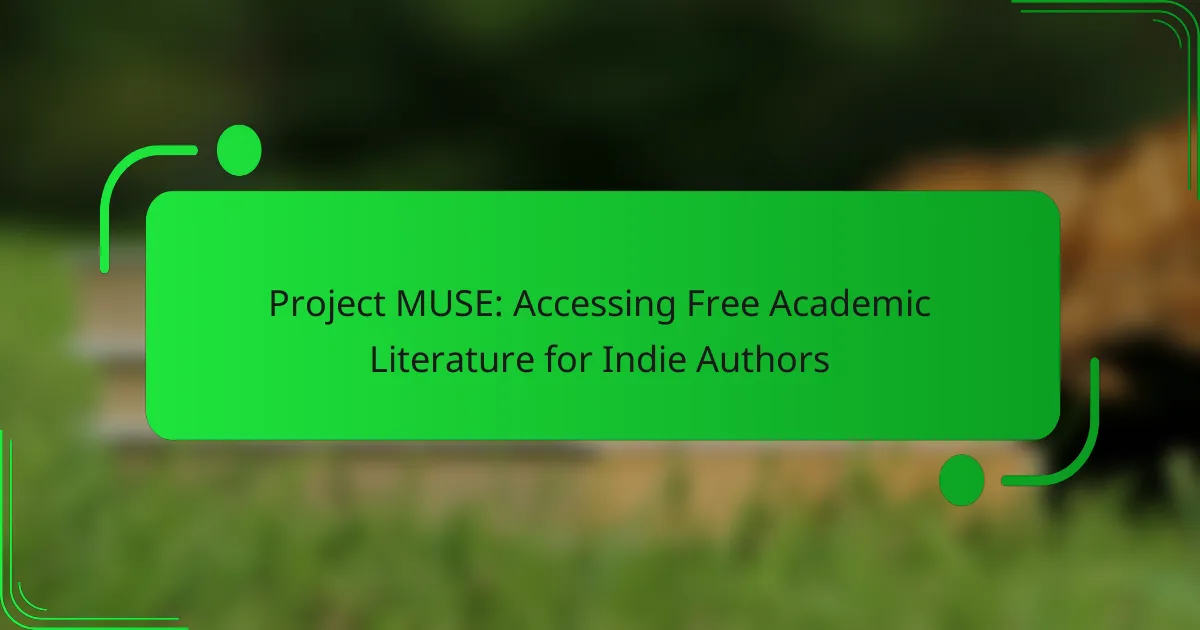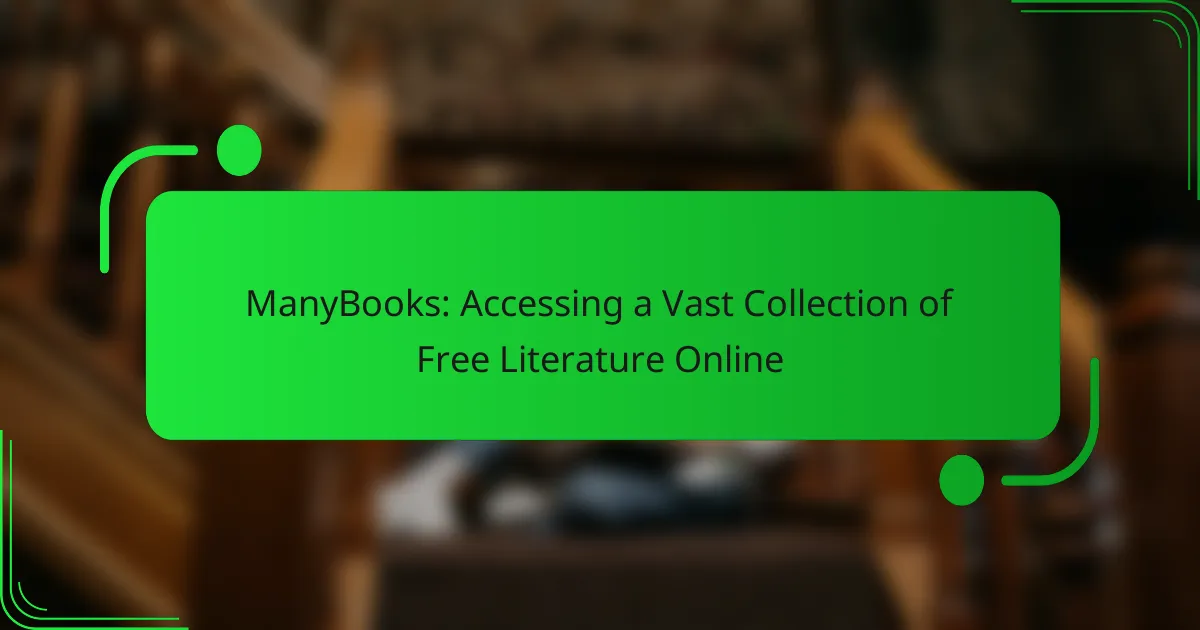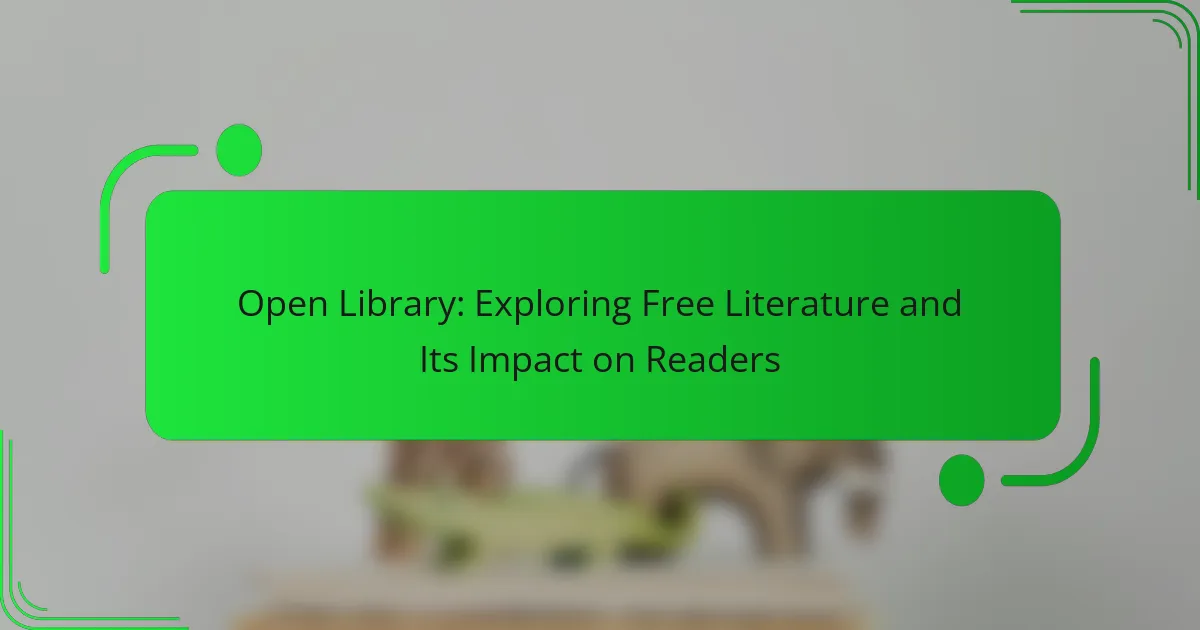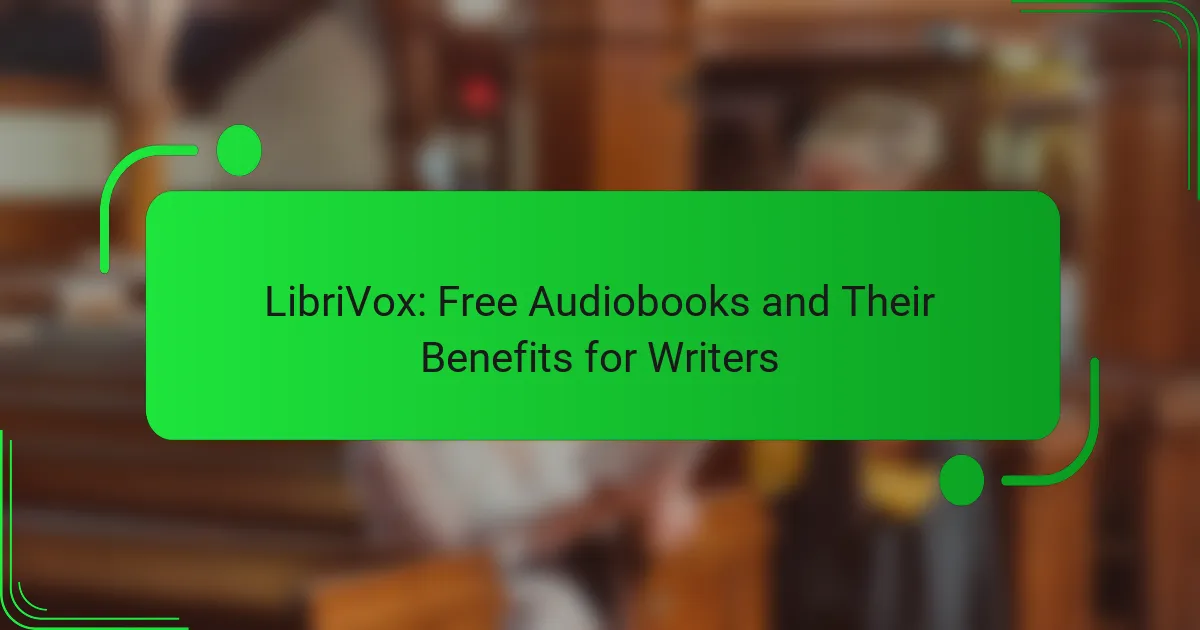Accessing free ebooks and audiobooks can be a challenge for many readers and indie authors. Project Gutenberg offers over 60,000 public domain titles, enhancing visibility for indie authors. The platform supports various formats, ensuring easy access across devices. Users can explore its user-friendly interface and engage with the literary community while enjoying a diverse range of literature.
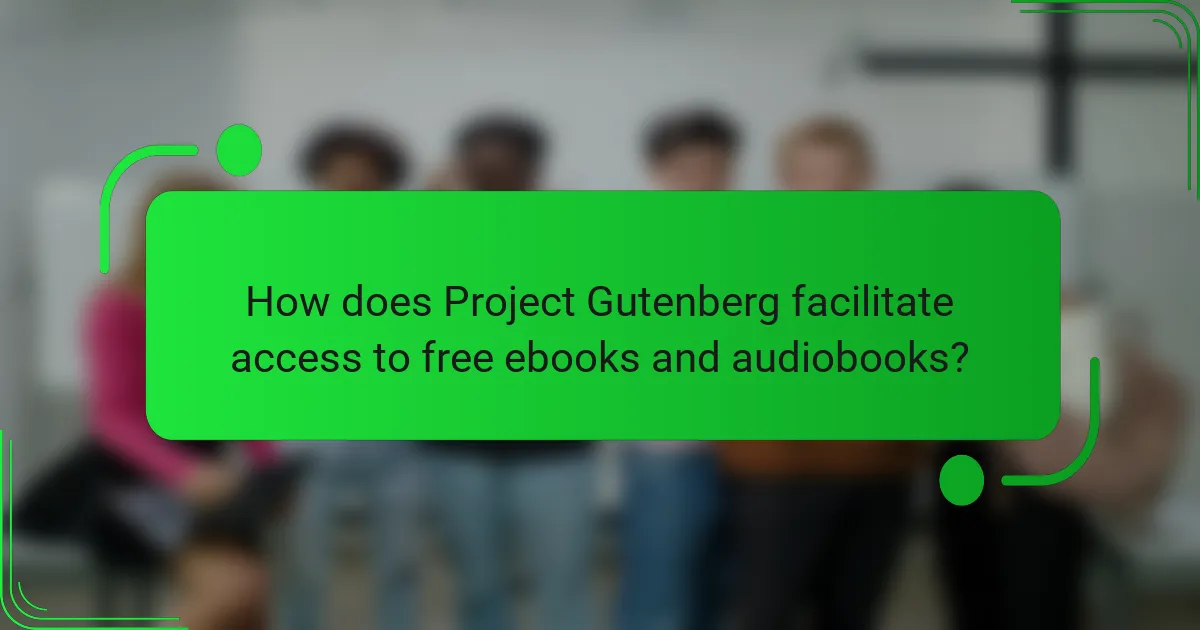
How does Project Gutenberg facilitate access to free ebooks and audiobooks?
Project Gutenberg provides free access to ebooks and audiobooks through a vast digital library. It hosts over 60,000 public domain titles, enabling readers and listeners to enjoy literature without cost. Users can download works in various formats, including ePub, Kindle, and plain text. This initiative supports indie authors by allowing them to share their works freely, increasing visibility and readership. The platform’s commitment to accessibility fosters a culture of reading and learning globally.
What types of content are available on Project Gutenberg?
Project Gutenberg offers a variety of content, including free ebooks, audiobooks, and texts from indie authors. Users can access over 60,000 public domain titles, ranging from classic literature to contemporary works. The site features various formats such as plain text, HTML, ePub, and Kindle, catering to different reading preferences. Additionally, audiobooks are available for select titles, enhancing accessibility for users.
Which formats can users access for ebooks and audiobooks?
Users can access ebooks and audiobooks from Project Gutenberg in various formats. Available formats include EPUB, Kindle, HTML, and plain text for ebooks, while audiobooks are offered in MP3 and Ogg Vorbis formats. Each format caters to different device compatibilities and user preferences, ensuring broad accessibility for indie authors’ works.
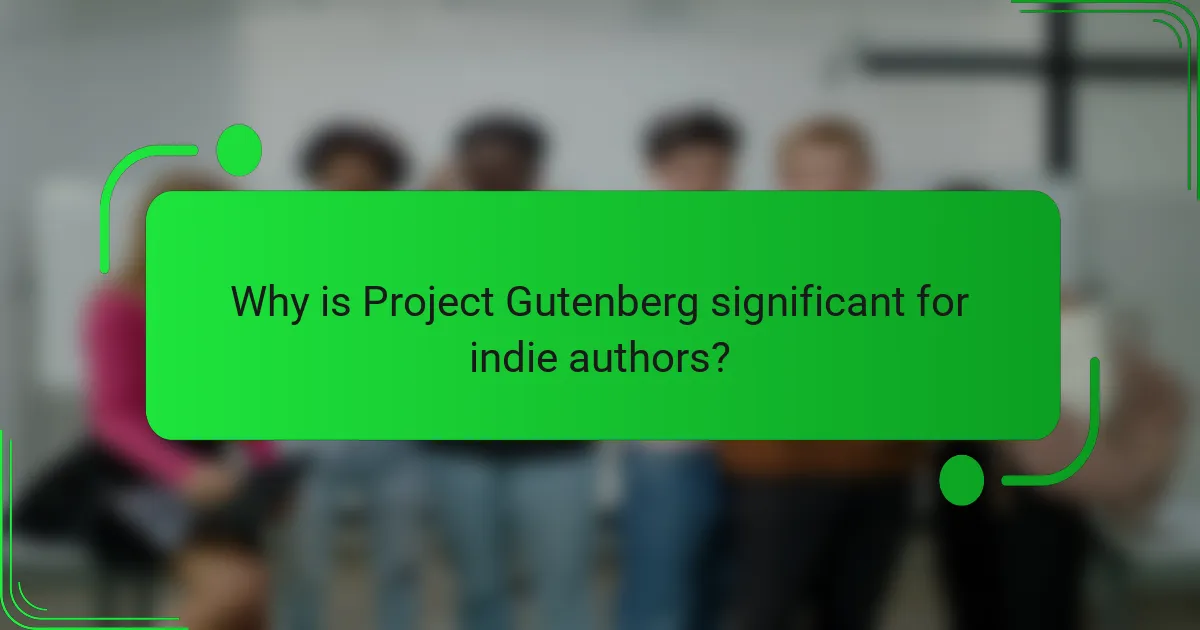
Why is Project Gutenberg significant for indie authors?
Project Gutenberg is significant for indie authors because it provides free access to a vast library of ebooks and audiobooks. This platform allows indie authors to reach a wider audience without the barriers of traditional publishing. By offering their works on Project Gutenberg, authors can gain visibility and potentially attract new readers. The platform supports various formats, making it easier for authors to distribute their content. Additionally, Project Gutenberg’s focus on public domain works encourages collaboration and sharing within the literary community.
How can indie authors benefit from publishing on Project Gutenberg?
Indie authors can gain significant exposure and access to a wider audience by publishing on Project Gutenberg. This platform offers a vast collection of free ebooks and audiobooks, which can enhance an author’s visibility.
Project Gutenberg allows indie authors to share their works with readers who seek free content, potentially leading to increased readership and fan engagement. The platform’s extensive reach can introduce indie authors to diverse demographics, fostering community and support around their writing.
Additionally, publishing on Project Gutenberg can enhance an author’s credibility. Being associated with a well-respected platform lends authority to their work, which may attract more readers and opportunities.
Ultimately, leveraging Project Gutenberg can serve as a strategic move for indie authors looking to expand their presence in the literary world.
What are the challenges faced by indie authors using Project Gutenberg?
Indie authors face several challenges when using Project Gutenberg. Limited visibility of their works can hinder discoverability. The platform primarily hosts public domain texts, making it difficult for indie authors to gain attention. Additionally, the lack of promotional tools on Project Gutenberg means authors must rely on external marketing efforts. Copyright issues can also arise, as authors must ensure their works comply with the platform’s guidelines. Finally, the absence of user engagement features limits interaction with potential readers.

What are the core features of Project Gutenberg that enhance user experience?
Project Gutenberg offers several core features that enhance user experience. These include a vast library of over 60,000 free ebooks, a user-friendly interface, and accessibility options for various devices. The platform supports multiple formats, such as EPUB, Kindle, and plain text, catering to diverse reading preferences. Additionally, users can access audiobooks and volunteer opportunities, fostering community engagement. The unique attribute of Project Gutenberg is its commitment to preserving literary works in the public domain, ensuring long-term access for future generations.
How does the search functionality work on Project Gutenberg?
The search functionality on Project Gutenberg allows users to find ebooks and audiobooks efficiently through various filters. Users can search by title, author, or subject, enhancing the discovery of indie authors’ works. The search results display relevant matches, making it easy to access free literary content. Additionally, users can refine their searches by language or publication date, ensuring a tailored experience.
What community resources are available for users?
Project Gutenberg offers various community resources for users, including free access to ebooks and audiobooks. Users can explore a vast collection of over 60,000 titles, enhancing their reading experience without cost. Volunteer contributions support the platform, allowing indie authors to share their work widely. Additionally, the site provides tools for users to create and share their own content, fostering a collaborative literary community.
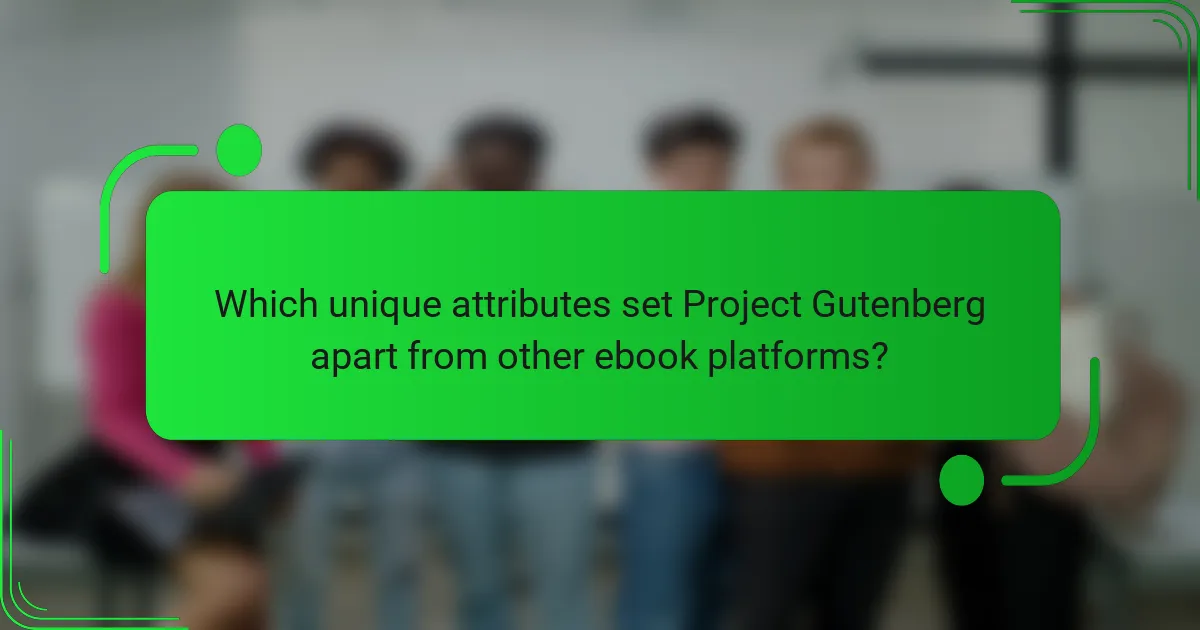
Which unique attributes set Project Gutenberg apart from other ebook platforms?
Project Gutenberg distinguishes itself through its vast collection of over 60,000 free ebooks, a commitment to public domain texts, and a focus on accessibility for indie authors. It offers unique attributes like a user-friendly interface, no registration requirements, and a community-driven model that encourages contributions. Additionally, it supports various formats, including plain text and HTML, catering to diverse reading preferences. These features enhance its appeal compared to other ebook platforms.
How does Project Gutenberg support multiple languages and regional needs?
Project Gutenberg supports multiple languages and regional needs by offering a vast collection of ebooks and audiobooks in various languages. The platform collaborates with volunteers worldwide to digitize and catalog works, ensuring accessibility for diverse audiences. This initiative includes texts in languages such as Spanish, French, German, and many others, catering to global users. Additionally, Project Gutenberg addresses regional needs by including culturally significant texts and promoting local authors, enhancing the representation of different literary traditions.
What partnerships or collaborations enhance Project Gutenberg’s offerings?
Collaborations with libraries and educational institutions enhance Project Gutenberg’s offerings. These partnerships expand access to a wider audience and enrich the collection with diverse titles. For instance, collaborations with universities facilitate the inclusion of academic texts, while public libraries help promote literacy and community engagement. Additionally, partnerships with technology companies improve the platform’s accessibility and user experience.
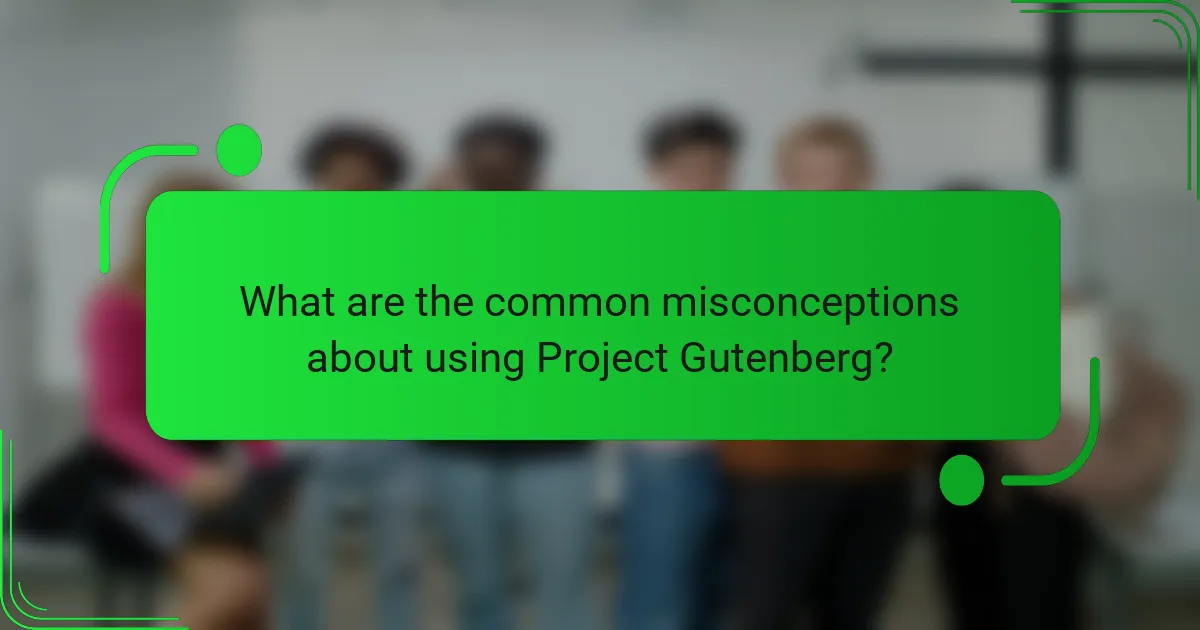
What are the common misconceptions about using Project Gutenberg?
Many misconceptions exist about Project Gutenberg, primarily regarding its content and usage. Users often believe that all ebooks and audiobooks are outdated or of poor quality. In reality, Project Gutenberg hosts a vast collection of classic literature, many of which are still relevant today. Another misconception is that the platform is difficult to navigate. However, it offers a user-friendly interface, making it accessible for all users. Some people think that all content is in the public domain, which is true for most but not all works. Users should verify copyright status for specific titles. Lastly, many believe that Project Gutenberg only serves traditional authors, while it actually supports indie authors through its platform, promoting diverse voices in literature.
How does copyright affect the availability of content on Project Gutenberg?
Copyright limits the availability of content on Project Gutenberg by restricting access to works that are still under copyright protection. This affects newer indie authors, as their works may not be freely available if they retain copyright. Project Gutenberg primarily offers public domain texts, which are no longer protected by copyright, ensuring a wide range of classic literature is accessible. However, the platform also seeks to support indie authors by providing options for free distribution of their works, as long as they comply with copyright laws.
What are the limitations of Project Gutenberg’s catalog?
Project Gutenberg’s catalog has several limitations. These include a limited selection of contemporary works, potential copyright issues, and variable quality of texts. Additionally, the platform may lack comprehensive metadata for some entries, making it challenging for users to find specific titles.
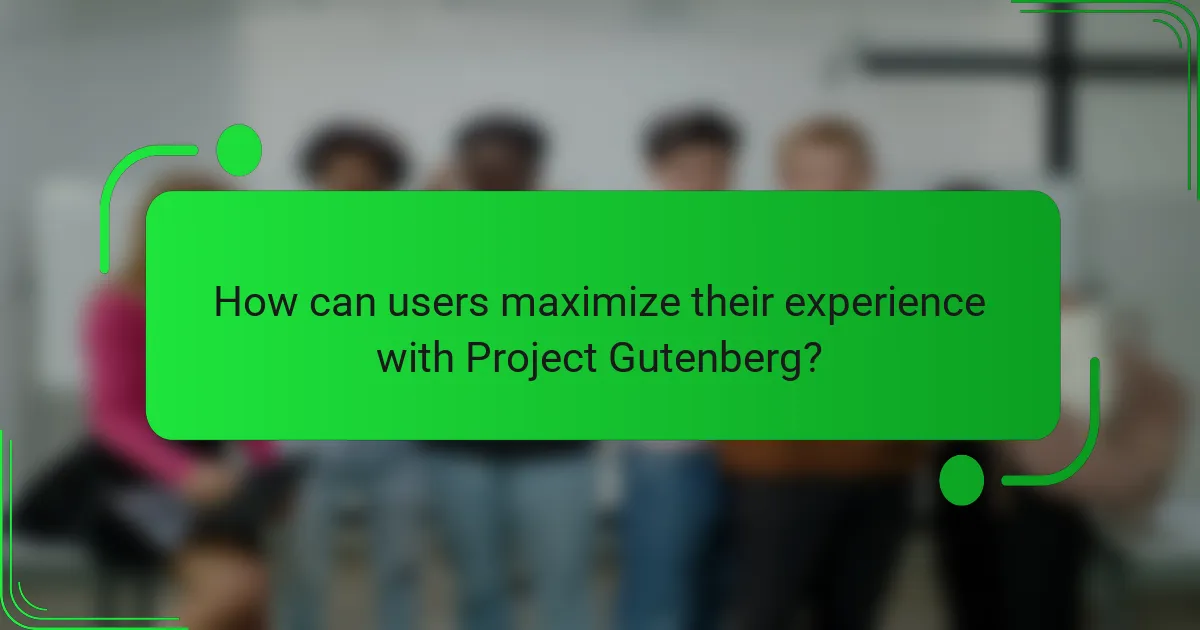
How can users maximize their experience with Project Gutenberg?
To maximize their experience with Project Gutenberg, users should explore its extensive collection and utilize search features effectively. Users can access over 60,000 free ebooks and audiobooks, enhancing their reading options.
1. Utilize advanced search options to find specific genres or authors.
2. Download ebooks in various formats, including ePub and Kindle.
3. Participate in community discussions to discover hidden gems.
4. Support indie authors by sharing their works available on the platform.
What best practices should users follow when navigating the site?
Users should follow these best practices to navigate Project Gutenberg effectively. Start by utilizing the search bar for specific titles or authors. Explore categories for genre-based browsing. Use the advanced search feature to filter results by language or format. Check the copyright status of works to ensure legal access. Bookmark favorite titles for easy retrieval. Finally, engage with community forums for recommendations and support.
What common mistakes should users avoid while accessing content?
Users should avoid common mistakes like improper navigation and overlooking search features. Many users fail to utilize the advanced search options, limiting their access to relevant titles. Additionally, neglecting to check the copyright status of books can lead to confusion. Users often miss out on audiobooks by not exploring the dedicated sections. Lastly, failing to create an account can restrict access to personalized features and updates.
Which tips can enhance the discovery of new ebooks and audiobooks?
Utilizing specific strategies can significantly improve the discovery of ebooks and audiobooks on Project Gutenberg. Focus on using targeted search terms, exploring curated lists, and leveraging community recommendations. Engage with social media groups dedicated to indie authors and literature to uncover hidden gems. Regularly check for new uploads and utilize advanced search filters to refine results.
